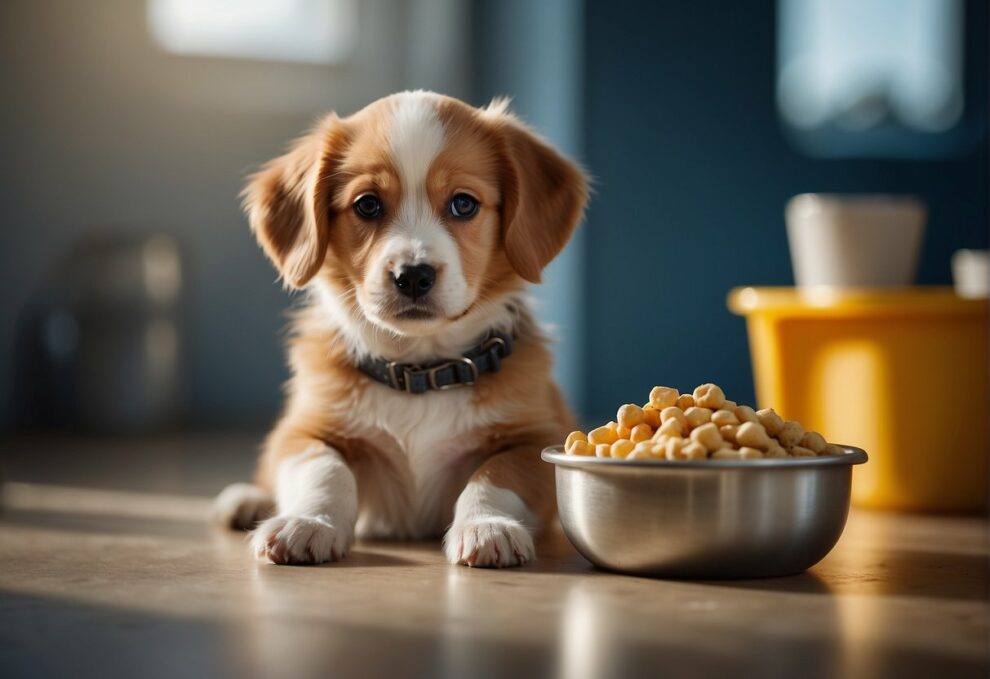When our puppies suddenly stop eating, it’s natural for us to worry.
Loss of appetite in dogs can be a sign that something is amiss.
Whether your puppy has lost interest in their kibble or turns away from a usually irresistible treat, it’s important we get to the bottom of why they’re not eating.
Puppies, with their smaller fat reserves, can’t go for more than about 12 hours without food before the lack of nutrition starts affecting their health.

Several factors could be affecting your puppy’s desire to eat.
Stress, stomach upset, or environmental changes may temporarily disrupt their eating habits.
However, it’s crucial to pay attention to their behavior; a dog not eating for more than 24 hours is concerning and could indicate sickness.
If you notice any sudden change in your puppy’s diet, it’s best not to wait too long before seeking veterinary advice.
Why Has My Puppy Stopped Eating – Identifying the Problem

Common Symptoms
If your puppy is experiencing a loss of appetite, you may notice that they’re not as eager to eat as usual.
This lack of appetite might be accompanied by vomiting or diarrhea, which can quickly lead to dehydration.
Some pups might display signs of pain or discomfort, and these may be more subtle, like a reduced willingness to play.
Watch for any changes in drinking habits or energy levels also, as these too can be indicators of an underlying problem.
Possible Causes
Several factors might be causing our puppy’s appetite to wane.
Stress is a common culprit, especially if the environment or routine has recently changed.
On the medical front, issues can range from parasites or a virus to more serious conditions like dental disease, foreign objects, or infections obstructing their system.
More concerning causes could be tumors, cancer, or kidney failure, although these are less likely to be the cause in a puppy.
It’s important to realise that some conditions require immediate medical attention.
If symptoms persist beyond 24 hours or are severe, it’s essential to seek veterinary care.
Dietary Considerations and Adjustments
Another important factor to consider when a puppy is not eating, is their diet.
Whether it’s transitioning to new foods, enhancing the appeal of their meals, or addressing health issues with special diets, the right dietary adjustments can cause problems or make a significant difference.
Transitioning Foods
Transitioning to new food should be a gradual process.
Sudden changes in a puppy’s diet can lead to digestive issues and a decreased appetite.
Start by mixing a small amount of the new food with the old, and over the course of a week, increase the proportion of new food.
This allows our pups to adjust without stress.
Making New Food More Appealling
Sometimes, just making food more appealing can encourage a puppy to eat. Ways to enhance food appeal include:
- Warming up canned or wet food slightly in the microwave to release the aromas, making the food more enticing.
- Adding warm water to dry food to make it softer and easier to eat, particularly for young puppies.
- Incorporating pungent-smelling foods, as a strong scent can stimulate their appetite.
- Mixing in palatable additives like yogurt or cottage cheese, which are also good for their health.
- Hand-feeding treats or kibbles may strengthen your bond and encourage them to eat.
Special Diets for Health Issues
If your puppy is suffering from a minor issue such as an upset stomach you must adjust their diet accordingly.
A bland diet, including boiled white rice and a lean protein source, can help a puppy with a sensitive stomach.
Always consult a vet before introducing a special diet.
If your furry friend is a picky eater, finding foods that cater to their specific food preferences is key to ensuring they receive the nutrition they need.
Health and Medical Concerns
It’s also crucial to consider health and medical concerns that could be hindering their appetite.
When to Seek Veterinary Attention
If your puppy refuses to eat for more than 24 hours, or if there are other worrying symptoms like vomiting or lethargy, it’s important to seek veterinary care immediately.
Dehydration and hypoglycemia (low blood sugar) can quickly become dangerous, especially in young dogs.
Recent vaccination can sometimes cause a mild reaction, but if your puppy’s appetite doesn’t return reasonably soon after, a vet visit is warranted.
You should also remain alert for any signs of adverse effects from medication.
Common Health Issues in Puppies
Puppies can be affected by various health issues that might impact their eating habits:
- Intestinal Parasites: Worms can cause discomfort and nutritional deficiencies.
- Pancreatitis: This inflammation of the pancreas can lead to a loss of appetite.
- Vaccination Reactions: Some puppies might temporarily lose their appetite after their vaccinations.
A veterinarian can provide a proper diagnosis and establish a treatment plan, which may include medication and special care.
Regular veterinary checkups are crucial to ensure puppies stay healthy and any problems are caught early.
Behavioral and Environmental Factors

When we consider why our puppies may have stopped eating, it’s important to look at their daily patterns and the situations they’re exposed to.
Changes in these areas can have a significant impact on their appetite.
Routine and Schedule
Our puppies thrive on consistency.
A disruption to their normal feeding schedule can throw off their appetite.
If we’ve recently changed the times we’re offering food or the frequency of their meals, it could explain their lack of interest in food.
It’s crucial to establish and maintain a predictable routine that includes set mealtimes, and we should also ensure they get regular exercise to stimulate their appetite.
Stress and Anxiety-Related Issues
Our puppies can experience stress and anxiety just like we do, and it can markedly decrease their desire to eat.
Factors such as separation anxiety when we’re away from home for extended periods can lead to a decreased appetite.
Environmental stressors, like moving to a new home or travel, can also impact their eating habits.
If we’ve introduced new people or pets into our home, our puppy may feel anxious, leading to behavioral issues that include skipping meals.
It’s our job to create a safe, calming environment for them and to seek guidance from peer-reviewed studies or professionals if we’re concerned about their mental well-being.
Helpful Tips for Encouraging Eating
When our puppies turn away from their meals, we need to become creative to encourage their eating.
Here are a few friendly tips to tempt their taste buds:
- Flavor Enhancement: Drizzling a little chicken broth over their food can make it more appealing.
The aroma and flavor are hard for pooches to resist.
- Treat Temptation: Mixing a few dog treats into their kibble can spark interest.
Make sure the treats are puppy-friendly and nutritious.
Mixing it Up:
- Lean Proteins: Stirring in some cooked, chopped lean beef or liverwurst can be a game-changer.
Rich in flavor, these proteins can boost their calorie intake in a healthy way.
- Peanut Butter Perks: A spoonful of peanut butter—make sure it’s xylitol-free—can make their regular kibble irresistible.
Interactive Dining:
- Fun with Food Dishes: Sometimes, the right food dish or a puzzle food dispenser adds excitement to meal times.
Monitoring Food Intake:
- Keep an eye on their fat reserves and daily calories.
If your puppy isn’t eating, consult with a vet to ensure their nutritional needs are met.
Remember, if our pups are still refusing food despite these tricks, it might be time to visit our vet to rule out any health issues.















